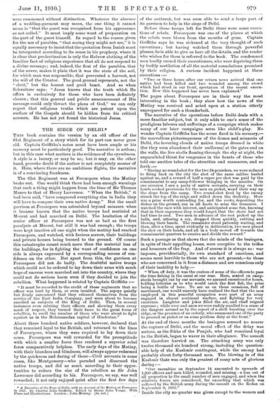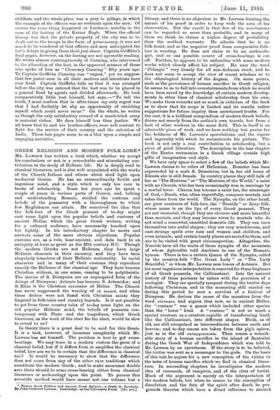THE SIEGE OF DELFII.* Tins book contains the version by
an old officer of the 61st Regiment of a story which for its part can never grow old. Captain Griffiths's notes must have been ample or his memory must be particularly good. The narrative is artless; but in this case what matters is the evidence of the eyewitness. A style is a luxury, or may be so ; but it may, on the other hand, provoke doubt if the author is not completely master of it. Here, where there are no ambitious flights, the narrative is of a convincing frankness.
The 61st Regiment was at Ferozepore when the Mutiny broke out. One would think there had been enough warnings that such a thing might happen from the time of Sir Thomas Munro to that of Henry Lawrence. " When the British," it had been said, "have conquered everything else in India they
will have to conquer their own native Army." But the small garrison at Ferozepore was astonished beyond measure when it became known that the native troops had mutinied at. Meerut and had marched on Delhi. The hesitation of the
senior officer at Ferozepore was not so bad as the first paralysis at Meerut, but still it was bad enough ; the troops were kept inactive all one night when the mutiny had reached Ferozepore, and watched, with furious sorrow, their buildings and private houses being burned to the ground. Of course this catastrophe meant much more than the material loss of the buildings, for in fighting the want of confidence on one side is always expressed by a corresponding access of con- fidence on the other. But apart from this, the garrison at Ferozepore did not do badly. The doubtful native troops which could not be ordered to lay down their arms with much hope of success were marched out into the country, where they could not do serious harm even if they decided to join the rebellion. What happened is related by Captain Griffiths :—
"It must be recorded to the credit of these regiments that no officer was hurt by them, or even insulted. The sepoys quietly but firmly announced that they released themselves from the service of the East India Company, and were about to become enrolled as subjects of the King of Delhi. Then, in several instances even saluting their officers and showing them every mark of respect, they turned their faces to the great focus of rebellion, to swell the number of those who were about to fight against us in the Mohammedan capital of Hindostan."
About three hundred native soldiers, however, declared that they remained loyal to the British, and returned to the lines of Ferozepore, where they were required to lay down their arms. Ferozepore was well rewarded for the promptitude with which a smaller force thus rendered a superior rebel force comparatively helpless. The early days of the Mutiny,
with their blunders and blindness, will always appear redeemed by the quickness and daring of those—Civil servants in some
cases, like Montgomery—who paraded and disarmed the native troops, and did as much according to their oppor- tunities to reduce the size of the rebellion as Sir John Lawrence did according to his. Ferozepore, we say, was well: rewarded; it not only enjoyed quiet after the first few days • A Narrative of the Siege of Delhi, with an Account of the Mutiny at Ferozepore' in 1857. By Charles John Grifhths. Edited by Henry John Yong°. With Plans and Illustrations. London : John Murray. [9s. net.]
of the outbreak, but was soon able to send a large part of its garrison to help in the siege of Delhi.
Before these troops left for Delhi there were some execu- tions of rebels. Ferozepore was one of the places at which the rebels were blown from the mouths of guns. Captain Griffiths says he was sickened at the very thought of such executions but having watched them through powerful glasses, he is able to give us here all the details, and the reader who wishes for them is referred to the book. The condemned men loudly cursed their executioners, who were depriving them by bodily mutilation of all the material consolations promised by their religion. A curious incident happened at these executions :-
"Two or three hours after our return news arrived that one native had been killed and two wounded among the crowd which had stood in our front, spectators of the recent execu- tion. How this happened has never been explained."
The pages about Ferozepore are in their way the most interesting in the book ; they show how the news of the Mutiny was received and acted upon at a station utterly unprepared for such a thunderbolt.
The narrative of the operations before Delhi deals with a more familiar subject, but it only adds to one's sense of the prodigious labours and sufferings of a campaign whioh makes many of our later campaigns seem like child's-play. No wonder Captain Griffiths has the scene fixed in his memory,— the marvellous picturesqueness of the domes and minarets of Delhi, the hovering clouds of native troops dressed in white (for they soon abandoned their uniforms) at the gates and on the walls, the live shells flaming through the sky at night, the unparalleled thirst for vengeance in the hearts of those who told one another tales of the atrocities and massacres, and so forth:—
"Having no round-shot for the two 24-pounders, we were reduced to firing back on the city the shot of the same calibre hurled against us, and a reward of half a rupee per shot was paid by the commissariat to any camp-follower bringing in the missiles. On one occasion I saw a party of native servants, carrying on their heads cooked provisions for the men on picket, wend their way up the slope from the camp. Two round-shot fired by the enemy struck the top of the ridge and rolled down the declivity. Here was a prize worth contending for, and the cooks, depositing the dishes on the ground, ran in all haste to seize tho treasures. I watched the race with interest, and anticipated some fun, knowing that in their eagerness they would forget that the shots had not had time to cool. Two men in advance of the rest picked up the balls, and, uttering a cry, dropped them quickly, rubbing and blowing their hands. The remainder stood patiently waiting, and then, after a time, spent evidently in deliberation, two men placed the shot on their heads, and all in a body moved off towards the commissariat quarters to receive and divide the reward."
Suoh a passage as that shows that the minds of the besiegers, in spite of their appalling losses, were receptive to the trifles and humours of the fray. And of course it is always so : war imposes, providentially, its own standard of emotions, and seems most horrible to those who are not presenk—to those who are concerned in it from a distance and, are conscious only of their inability to help:—
" When off duty, it was the custom of some of the officers to pass the time fishing in the canal at our rear. Here, seated on camp- stools brought out by our servants, we amused ourselves for hours, holding lotteries as to who would catch the first fish, the prize being a bottle of beer. To see us on these occasions, full of merriment, one would scarcely have realised the fact that the mon employed in this peaceful occupation were part of an army engaged in almost continual warfare, and fighting for very existence. Laughter and jokes filled the air, and chaff reigned supreme ; while ever and anon we were rudely recalled to a sense of the dangers around us by the report of a shell bursting over the ridge, or the presence of an orderly, who summoned one of the party to proceed on picket or on some perilous duty at the front."
At the end of three months the besiegers seemed no nearer the capture of Delhi, and the moral effect of the delay wail serious, as the Sikhs of the Punjab, who had remained loyal to the British, began to waver in their allegiance. The assault was therefore hurried on. The attacking army was only twelve thousand six hundred strong, including the question- able help of the Kashmir contingent, while the enemy had probably about forty thousand men. The blowing in of the Kashmir Gate was only the greatest of many acts of glorious daring :- "Our easuaties on September 14 amounted to upwards of 1,200 ()Moen and men killed, woanded, 411d missing—a loss out of all proportion to the small number of men engaged, and when the relatives forces are considered, far exceeding that which was suffered by the British army during the assault on the Bedell on September 8, 1855."
Inside the city no quarter was given except to the women and
children, and the whole place was a prey to pillage, in which the example of the officers was no restraint upon the men. Of course the same thing happened at Lucknow, notably in the case of the looting of the Kaisar Bagh. When the official theory was that the private property of the city was to be dealt out to the troops in the form of prize-money, it was not much to be wondered at that officers and men anticipated the law's delays in giving them their just share. Captain Griffiths's final pages, however, on the looting are not agreeable reading. He writes almost contemptuously of Canning, who intervened in the allocation of the loot, in the approved manner of those who spoke of him as " Clemency Canning" fifty years ago. To Captain Griffiths Canning was " unjust," yet we suppose that few juster men in all their motives and intentions have ever lived. Captain Griffiths tells us that it was arranged before the city was entered that the loot was to be placed in a general fund by agents and divided afterwards. He took comparatively little loot himself, but says :—" To tell the truth, I must confess that in after-times my only regret was that I had foolishly let slip an opportunity of enriching myself which could never recur." On the whole, he writes as though the only satisfactory reward of a much-tried army is material riches. He does himself less than justice. We all know that he and his brother-officers were well content to fight for the service of their country and the salvation of India. These last pages seem to us a blot upon a simple and engaging narrative.















































 Previous page
Previous page